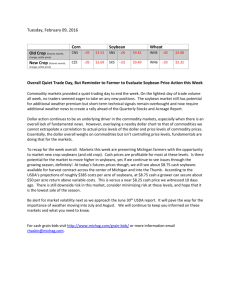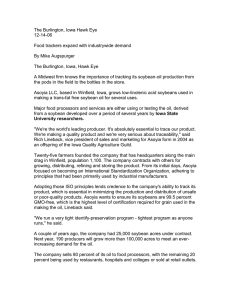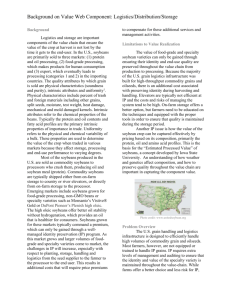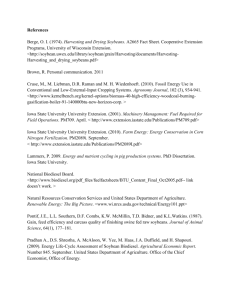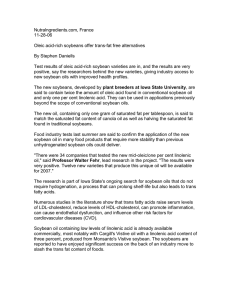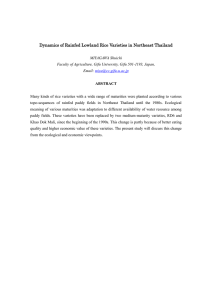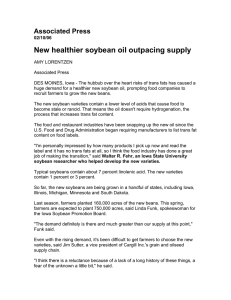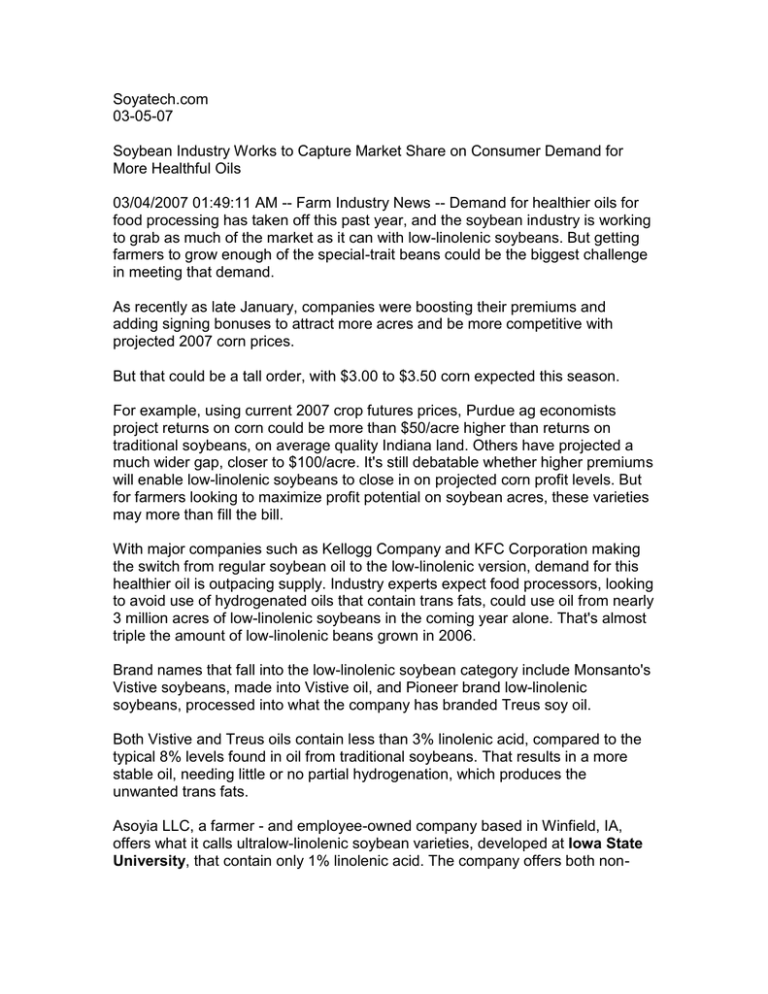
Soyatech.com
03-05-07
Soybean Industry Works to Capture Market Share on Consumer Demand for
More Healthful Oils
03/04/2007 01:49:11 AM -- Farm Industry News -- Demand for healthier oils for
food processing has taken off this past year, and the soybean industry is working
to grab as much of the market as it can with low-linolenic soybeans. But getting
farmers to grow enough of the special-trait beans could be the biggest challenge
in meeting that demand.
As recently as late January, companies were boosting their premiums and
adding signing bonuses to attract more acres and be more competitive with
projected 2007 corn prices.
But that could be a tall order, with $3.00 to $3.50 corn expected this season.
For example, using current 2007 crop futures prices, Purdue ag economists
project returns on corn could be more than $50/acre higher than returns on
traditional soybeans, on average quality Indiana land. Others have projected a
much wider gap, closer to $100/acre. It's still debatable whether higher premiums
will enable low-linolenic soybeans to close in on projected corn profit levels. But
for farmers looking to maximize profit potential on soybean acres, these varieties
may more than fill the bill.
With major companies such as Kellogg Company and KFC Corporation making
the switch from regular soybean oil to the low-linolenic version, demand for this
healthier oil is outpacing supply. Industry experts expect food processors, looking
to avoid use of hydrogenated oils that contain trans fats, could use oil from nearly
3 million acres of low-linolenic soybeans in the coming year alone. That's almost
triple the amount of low-linolenic beans grown in 2006.
Brand names that fall into the low-linolenic soybean category include Monsanto's
Vistive soybeans, made into Vistive oil, and Pioneer brand low-linolenic
soybeans, processed into what the company has branded Treus soy oil.
Both Vistive and Treus oils contain less than 3% linolenic acid, compared to the
typical 8% levels found in oil from traditional soybeans. That results in a more
stable oil, needing little or no partial hydrogenation, which produces the
unwanted trans fats.
Asoyia LLC, a farmer - and employee-owned company based in Winfield, IA,
offers what it calls ultralow-linolenic soybean varieties, developed at Iowa State
University, that contain only 1% linolenic acid. The company offers both non-
genetically modified and Roundup Ready varieties, with the former garnering as
much as $1.00/bu. premiums for this coming season.
Companies are working to contract for as many acres of low-linolenic soybeans
as they can get to meet the incredible demand, and one processor - AGP - raised
its premiums by $0.20 in late January for existing and new contracts, hoping to
attract more acres. "This is a real opportunity for the soybean industry to meet
the changing demands for healthier oils," says Greg Twist, senior vice president
for soy and corn processing, AGP.
Worth some soybean acres
Although low-linolenic soybeans may not steal too many acres from corn this
season, the higher premiums may make producers consider them for some of
their soybean ground. "We think our new premiums will encourage more
producers to give them a try," Twist says.
"We'll be taking most of our new acres from traditional soybeans this year,"
concurs Brett Maxwell, vice president of operations for Asoyia. "There is an
unusually high number of flex acres out there yet that farmers haven't made a
definite cropping decision about this year. I expect we'll be signing contracts with
some growers as late as April."
If you've got the flexibility to handle an identity-preserved crop, low-linolenic
beans may add profit over conventional soybeans, says Rick Nobbe, eastern
region Vistive soybean manager for Croplan Genetics. "For this season, most
processors are offering a $0.35 to $0.60 premium for these beans, and that is a
pretty good return just for harvesting and handling them separately," Nobbe says.
He notes that the number of processing and receiving locations has increased for
2007. "There are several new locations that will be processing the beans in Ohio,
Illinois and Indiana," he says.
Many cooperating elevators also have agreed to receive and separately store the
beans, providing more drop points for participating farmers.
Bunge has expanded its processing of Pioneer brand low-linolenic soybeans to
include southern Minnesota, more of Iowa, northern Missouri, Wisconsin,
Michigan, Illinois and Indiana for this season. Asoyia has broadened its
geography to include processing in Cedar Rapids, IA, and Bloomington, IL.
"We've definitely got a more grower-friendly program this year, with wider
windows for delivery and what should be shorter waits for truckers," says Rich
Lineback, Asoyia vice president of sales and marketing.
Yield concerns
Nobbe admits that because 2007 is only the third year of low-linolenic soybean
production, some farmers may not be familiar enough with the varieties to try
one. And although some producers fear the low-linolenic won't yield as well as
their traditional varieties, he says field trials show otherwise.
"Like any soybean, these varieties have to be positioned right - planted in the
right fields that best match their characteristics - to get the best yields. When
that's done, Vistive soybeans are very competitive in yield with conventional
Roundup Ready varieties," he says.
According to Lineback, Iowa State University soybean breeders have boosted
the yields of several of their ultralow-linolenic varieties by 5 bu./acre over the last
three years. "And this year Asoyia is offering more Group III varieties as well as
two Roundup Ready varieties," he says.
Soybean cyst nematode resistance, stronger disease resistances and iron
chlorosis tolerance also have been bred into many low-linolenic varieties
available this season.
"These are solid varieties; we wouldn't be offering them if they weren't," Lineback
states. "We've had producers who get up to a $50/acre advantage over
traditional beans with our ultralow-linolenic varieties."
Identity preserved
Signing a contract to produce low-linolenic soybeans requires the use of basic
identity-preserved practices. For its ultralow-linolenic varieties, Asoyia requires
that farmers follow set production, harvest and storage protocols, especially for
the non-genetically modified varieties. "By testing the crop at harvest and in
storage, we are trying to help ensure that the farmer will have no problems with
contamination at delivery," Lineback says. "It's a valuable crop and we want to be
able to process every bushel of beans the farmer delivers. Our IP program has
proven very successful. I know of only one truckload of beans that was turned
away at a processing facility all last year."
Farmers who are comfortable with the identity-preserved process will have more
opportunities to improve the profitability of their soybeans. "We're only at the
beginning of producing and handling specialty-trait crops," Twist says.
"There's more in the pipeline for the next five to seven years, including high oleic
varieties and those with omega 3 oils. These types of specialty traits hold great
potential for food processors, as well as soybean producers."
Specialty soybeans
These companies offer low-linolenic or ultralow-linolenic soybean varieties.
MONSANTO
Brand: Vistive low-linolenic soybeans
Specialty trait: 3% linolenic acid content in oil
Available varieties: 28 seed brands carry Group II and III
Vistive varieties
Processors: ADM, AGP, CHS, Cargill, Mercer Landmark, MN Soybean
Processors, Perdue Inc., Zeeland Farm
Premium: $0.35 to $0.60/bu., depending on location and processor
Delivery points: Iowa, Indiana, Michigan, Minnesota, Nebraska, Ohio, Maryland
2006 acres: 500,000
2007 acre goal: 1.5 to 2 million
Visit www.monsanto.com/monsanto/layout/featured/vistive.asp, or circle 105.
DUPONT & BUNGE
Brand: Pioneer brand low-linolenic soybeans
Specialty trait: 3% linolenic acid content in Treus brand soybean oil
Available varieties: Five Roundup Ready varieties from mid Group II to early
Group III
Processors: Bunge, CHS
Premium: $0.45/bu. for harvest delivery; $0.50/bu. for on-farm storage
Delivery points: Iowa, Illinois, Indiana, Ohio, Michigan, Missouri, Pennsylvania
and Wisconsin
Special contract features: Contracted acres eligible for rebate on approved
DuPont crop protection products
2006 acres: just under 200,000
2007 acre goal: 400,000 to 500,000
Visit www.pioneer.com/llsoy/benefits.htm, or circle 106.
ASOYIA LLC
Brand: Asoyia ultralow-linolenic soybeans
Specialty trait: 1% linolenic acid content in soybean oil
Available varieties: Five Group II and III non-genetically modified varieties and
two Roundup Ready Group II varieties, plus several experimental varieties
Processor: Cargill
Premium: $0.45/bu. for Roundup Ready varieties; $1.00/bu. for non-genetically
modified varieties
Delivery points: throughout Iowa and around Bloomington, IL
Special contract features: Transportation allowance of $0.05 to $0.15/mile
2006 acres: 35,000 acres
2007 acre goal: 100,000 acres
Visit www.asoyia.com/Growers.asp, or circle 107.
Author: Peg Zenk
Copyright 2007 by Prism Business Information. All rights
reserved.www.prismb2b.com

